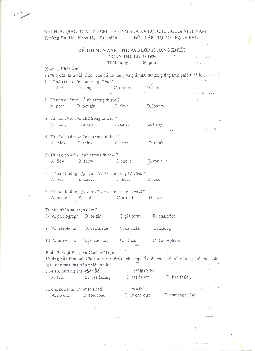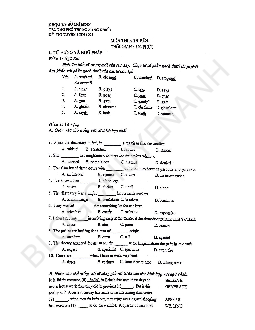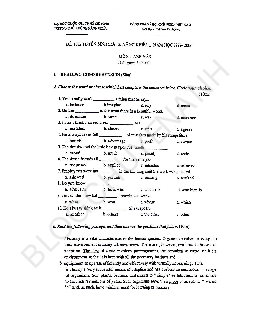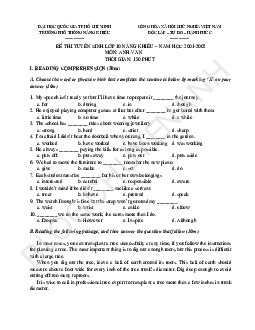





Preview text:
ĐẮK NÔNG
Mark the letter A, B, C, or D on your answer sheet to indicate the word whose underlined part
differs from the other three in pronunciation in each of the following questions.
Question 1. A. distinguished B. admitted C. overloaded D. talented A. /dɪˈstɪŋɡwɪʃt/ B. /ədˈmɪtɪd/ C. /ˌəʊvəˈləʊdɪd/ D. /ˈtæləntɪd/
Question 2. A. decoration B. celebration C. candle D. cake A. /ˌdekəˈreɪʃn/ B. /ˌselɪˈbreɪʃn/ C. /ˈkændl/ D. /keɪk/
Mark the letter A, B, C, or D on your answer sheet to indicate the most suitable response to
complete each of the following exchanges.
Question 3. Jack: “How do you usually go to school?” ~ Jane: “ .”
A. Fifteen minutes B. Every day C. One kilometer D. On foot
●Bạn thường đến trường bằng cách nào? → On foot (Đi bộ)
Question 4. Mary: “I’m going to have an exam tomorrow.” ~ Ann: “ _ .” A. Good luck B. See you C. Thank you D. Bye bye ●Good luck: Chúc may mắn ●See you: Hẹn gặp lại
Mark the letter A, B, C or D on your answer sheet to indicate the correct answer to each of
the following questions.
Question 5. People will travel in solar-powered cars in the future, ? A. will they B. won't they C. do they D. don't they
●Cấu trúc câu hỏi đuôi: đông từ chính “will” --> won’t they
Question 6. Hoa Lan: “My grades are terrible.” ~ Mrs Quyen: “If you want to get good grades, you study hard.” A. will be B. must C. has to D. ought
●Cấu trúc câu điều kiện loại 1: If + S + V (simple present), S + will/can/shall/must + V
Question 7. Although there are many
throughout the year, Tet or the Lunar New Year holiday is
the most important one for Vietnamese people. A. celebrate B. to celebrate C. Celebrating D. celebrations ●There are many + N(s)
●Celebrate /ˈselɪbreɪt/ (v) tổ chức
●Celebration /ˌselɪˈbreɪʃn/ (n) sự tổ chức
Question 8. Jeans have never been out of fashion, and today the young generation is still of wearing them. A. fond B. keen C. amazed D. interested
Fond of (adj) = Keen on (adj) = interested in (adj): yêu thích Amazed at (adj) ngạc nhiên
Question 9. I think I've lost my new pen. I've
_it everywhere but I can't find it. A. looked at B. looked up C. looked for D. looked after ●look at: nhìn vào ●look up: tra (từ điển) ●look for: tìm kiếm ●look after: chăm sóc
Question 10. He is not a very intelligent boy;
he always gets good marks at school. A. as B. and C. but D. or ●As: bởi vì ●And: và
●But: nhưng (thường đứng sau dấu phẩy) ●Or: hoặc
Question 11. Maryam paid a visit to Hanoi last month. She was really _ by the beauty of the city. A. impress B. impression C. impressed D. impressively
●impress/ɪmˈpres/ (v) gây ấn tượng, làm cảm động
●impression /ɪmˈpreʃn/ (n) sự ấn tượng
●impressed/ɪmˈprest/ (v) bị ấn tượng, bị thu hút
●impressively/ɪmˈpresɪvli/ (adv) một cách nguy nga, gợi cảm
Question 12. I only have some old books. I wish I
a lot of interesting new books. A. have B. had had C. has D. had
●Câu ước: S + wish(es) + (that) + S + V-ed/were/p2
Question 13. Communicating with foreigners is the best way to _ your speaking skill in any language. A. put B. raise C. increase D. improve ●Put (v) đặt, để
●Raise /reɪz/ (v) nâng lên, đỡ dậy
●Increase /ɪnˈkriːs/ (v) tăng
●Improve /ɪmˈpruːv/ (v) cải thiện
Question 14. Mrs Nguyet: Congratulations! ~ Thien Thao: Thanks. I'm amazed _I have just
won the first prize in the English speaking contest. A. where B. Why C. which D. that
●Amazed (that) + clause (adj) ngạc nhiên rằng…
Question 15. Huyun Bin and Son Ye-jin from the hit Korean drama "Crash landing on You" got married _ March 31st 2022. A. about B. on C. at D. in
●Giới từ “on” chỉ các khoảng thời gian cụ thể hơn “in”; như là các thứ trong tuần, ngày tháng cụ thể và vào
các ngày lễ cụ thể có chứa từ “day”. (Có ngày → dùng ‘on’)
Question 16. Most of the children in my village enjoy football after school. A. to play B. play C. playing D. played ●Enjoy + V-ing (v) thích
Mark the letter A, B, C or D to indicate the word or phrase that is CLOSEST in meaning to
the underlined part.
Question 17. It was a difficult time, but we never gave up hope. A. stopped B. continued C. had D. offered
●Give up: từ bỏ = stop (v) dừng lại
●Continue /kənˈtɪnjuː/ (v) tiếp tục
●Offer/ˈɔːfər/ (v) đưa ra
Question 18. If women have to do too much housework, they cannot concentrate or work effectively. A. distract B. learn C. ignore D. focus
●Distract /dɪˈstrækt/ (v) làm sao lãng, làm rối trí
●Learn /lɜːrn/ (v) học tập, nghiên cứu
●Ignore /ɪɡˈnɔːr/ (v) phớt lờ
●Focus /ˈfəʊkəs/(v) = concentrate /ˈkɑːnsntreɪt/ (v) tập trung
Question 19. In some Asian countries like Vietnam or China, money is given to the newly-married
couple as a wedding present. A. souvenir B. gift C. contribution D. donation
●Souvenir /ˌsuːvəˈnɪr/(n) quà lưu niệm
●Gift/ɡɪft/ (n) = present /ˈpreznt/ (n) quà tặng
●Contribution /ˌkɒntrɪˈbjuːʃn/ (n) sự đóng góp
●Donation /dəʊˈneɪʃn/ (n) sự quyên góp
Question 20. Oliver's parents are very wealthy. They have lots of money and property. A. average B. abundant C. poor D. rich
●Average /ˈævərɪdʒ/ (adj) trung bình
●Abundant /əˈbʌndənt/ (adj) phong phú, nhiều ●Poor /pʊr/ (adj) nghèo
●Rich /rɪtʃ/ (adj) = wealthy /ˈwelθi/ (adj) giàu có
Mark the letter A, B, C or D to indicate the underlined part that needs correction.
Question 21. I admire Tom because he is a handsome and friend student in his school. A. friend B. is C. student D. because
●Friend (n) bạn bè → friendly (adj) thân thiện
Question 22. More and more students took part in the entrance examination to Nguyen Chi Thanh gifted high school every year. A. in B. examination C. took D. students
●‘Every year’: hằng năm → chia thì hiện tại đơn ●Took → take
Question 23. I suggest that you should spending more time practising your speaking skill to improve your English. A. improve B. spending C. practising D. speaking skill ●Should + Vinf ●Spending → spend
Read the passage and mark the letter A, B, C or D to indicate the best answer for each of the following blanks. Ha Long Bay, (24) _
in Quang Ninh Province, Viet Nam, was recognised as a World Heritage
Site by UNESCO in 1994. It is famous (25) _
its beautiful scenery. With its thousands of rocks
and caves emerging out of the water, Ha Long Bay has won (26)
_ recognition. As visitors (27)
this magnificent place, there are always new surprises for them.
Cruise tours are very popular in Ha Long Bay. There are different cruise tours (28) tourists can visit (29)
different caves, and experience the local culture and life on the water. Therefore, a tour may (30) from several hours to (31)
day, which gives the visitors a great experience.
Ha Long Bay cuisine presents another attraction for (32)
. It is well-known for its fresh seafood (33)
crabs, prawns, and sea clams. A trip to Ha Long Bay is not complete without tasting
the authentic local food served in many restaurants in the area.
Question 24. A. belonged B. located C. placed D. stayed
●Belong (to) /bɪˈlɔːŋ/ (v) thuộc về
●Locate /ləʊˈkeɪt/ (v) tọa lạc tại
●Place /pleɪs/ (v) đặt, để ●Stay /steɪ/ (v) ở Question 25. A. for B. to C. about D. with
●Famous for /ˈfeɪməs/ (adj) nổi tiếng
Question 26. A. nationality B. international C. nationally D. nation
●Nationality /ˌnæʃəˈnæləti/ (n) quốc tịch
●International /ˌɪntərˈnæʃnəl/ (adj) về mặt quốc tế
●Nationally /ˈnæʃnəli/ (adv) về mặt dân tộc; về mặt quốc gia
●nation /ˈneɪʃn/ (n) quốc gia
Question 27. A. exploring B. to explore C. explore D. explored
●Explore /ɪkˈsplɔːr/ (v) khám phá Question 28. A. so B. although C. but D. unless ●So: vì vậy ●Although: mặc dù ●But: nhưng ●Unless: nếu không
Question 29. A. a little B. many C. much D. little
●Much + danh từ không đếm được, có nghĩa là “nhiều”
●Many + với danh từ đếm được số nhiều, có nghĩa là “nhiều”
●A little + danh từ không đếm được: có một chút, đủ để làm gì
●Little + danh từ không đếm được: có một chút (nhưng không đủ) Question 30. A. dance B. sing C. last D. visit ●Dance (v) nhảy ●Sing (v) hát ●Last (v) kéo dài ●Visit (v) thăm Question 31. A. the B. a C. some D. an
Question 32. A. tourists B. students C. freshmen D. villagers
●Tourist/ˈtʊrɪst/ (n) du khách
●Freshmen /ˈfreʃmən/ (n) sinh viên năm nhất
●Villager /ˈvɪlɪdʒər/ (n) dân làng Question 33. A. such as B. in addition C. moreover D. example
●Such as…: như là…. (dùng để liệt kê)
●In addition: thêm vào đó (dùng ở đầu câu)
●Moreover: hơn nữa (dùng ở đầu câu)
●Example /ɪɡˈzæmpl/ (n) ví dụ
Mark the letter A, B, C or D to indicate the best answer for each of the following question.
British engineers and scientists have published plans for a new hypersonic plane called the A2. It will be
very fast. At the moment, a flight from London in the UK to Sydney in Australia takes about twenty- one
hours but with the A2 the same flight will take about four hours. The flight will fly at 4,500 kilometers per
hour and will fly at an altitude of over 10,000 meters. It will carry 300 passengers but it won't have any
windows because scientists haven't found glass that is strong enough. It will be better for the environment
than other planes because the engines won't produce gases that cause pollution.
In the future, will people travel from London to Australia for the weekend? It's possible! But how much
will a ticket cost? The planners say that it won't be very expensive - about £2,000. The A2 will be ready for its first flight in 2030.
Question 34. How long will it take the A2 plane to fly from London to Sydney?
A. about twenty-one hours B. about one hour C. about four hours D. about six hours
●Key: At the moment, a flight from London in the UK to Sydney in Australia takes about twenty- one hours
but with the A2 the same flight will take about four hours.
Question 35. What will the speed of the A2 plane be?
A. At 4,500 kilometers per hour
B. At 10,000 kilometers per hour
C. At 300 kilometers per hour
D. At 2000 kilometers per hour
●Key: The flight will fly at 4,500 kilometers per hour and will fly at an altitude of over 10,000 meters
Question 36. According to the text, which statement is TRUE about the A2 plane?
A. It will be environmentally unfriendly.
B. It will be ready for its first flight in 2300.
C. It can fly at an altitude of 10,000 kilometers.
D. We won't find any windows in the plane.
●Key: It will carry 300 passengers but it won't have any windows because scientists haven't found glass that is strong enough.
Question 37. How many passengers can a new hypersonic plane carry? A. 4,500 B. 2,000 C. 300 D. 2030
●Key: It will carry 300 passengers but it won't have any windows because scientists haven't found glass that is strong enough.
Question 38. How much will a ticket for the A2 flight from London to Sydney cost? A. about £2,000 B. very expensive C. very cheap D. about £3,000
●Key: The planners say that it won't be very expensive - about £2,000.
Read the following passage and mark the letter A, B, C or D to indicate the correct answer for
each of the questions.
Today, in many parts of the world, it is customary for people to shake hands upon meeting as a gesture
of goodwill. Originally, however, the practice of shaking hands had more practical purposes.
Shaking hands originated in medieval times. In those days, when a man came on a stranger, he would
often automatically reach for his sword with his right hand, in case he had to use the weapon to
defend himself. Sometimes, both parties found themselves circling around each other, weapons in
hand, until it was mutually agreed that the weapons could be laid aside. Then the two parties
extended their right hands to show they had no weapons, and clasped them. This was the beginning of the handshake.
The custom of shaking hands is not a universal one. In the orient, people have for centuries, clasped
their own in front of them upon meeting to show they held no weapons. In France, a custom
developed in which people who met would kiss each other on both cheeks. The natives of some
South Seas islands greet by rubbing noses.
Note: clasp (v): nắm chặt, siết chặt.
Question 39. The word "came on" in the second paragraph can be best replaced by A. visited B. met C. attacked D. waited
●Come on sb: tình cờ gặp ai
Question 40. In medieval times, the purpose of shaking hands was
A. to show that both parties were ready for fight.
B. to show that there were no weapons in hands.
C. to show a gesture of goodwill.
D. to show a good relationship with each other.
●Key: Shaking hands originated in medieval times…. Then the two parties extended their right hands to
show they had no weapons, and clasped them.
Question 41. The word "they" in paragraph 2 refers to A. strangers B. weapons C. hands D. parties
Question 42. According to the passage, the practice of shaking hands .
A. used to be popular, but now it is out of date B. was used to extend greetings
C. is considered not to be polite
D. is replaced by other customs in some countries
●Key: In the orient, people have for centuries, clasped their own in front of them upon meeting to
show they held no weapons. In France, a custom developed in which people who met would kiss
each other on both cheeks. The natives of some South Seas islands greet by rubbing noses.
Question 43. Which of the following is NOT TRUE about the handshake? A.
It is one of the social customs. B. It is a gesture of goodwill. C.
It is very popular in all countries in the world. D.
It happened for the first time very long time ago. ●Key:
The custom of shaking hands is not a universal one. → A is correct
it is customary for people to shake hands upon meeting as a gesture of goodwill. → B is correct
Shaking hands originated in medieval times. → D is correct
Mark the letter A, B, C or D to indicate the sentence that is closest in meaning to the original one.
Question 44. The new hospital is bigger than the old one. A.
The old hospital is more smaller than the new one. B.
The new hospital is not as big as the old one. C.
The new hospital is not as small as the old one. D.
The old hospital is smaller than the new one. Công thức so sánh hơn: ●
Nếu từ chỉ có 1 âm tiết: ADJ/ADV + đuôi -er + than ●
Nếu từ có 2 âm tiết trở lên: more + ADJ/ADV + than
Question 45. She was so busy that she couldn't answer the phone. A.
Because she was very busy, she could answer the phone. B.
Although she was very busy, she could answer the phone. C.
Because she was very busy, she couldn't answer the phone. D.
Although she was very busy, she couldn't answer the phone.
●Cô ấy bận đến nỗi không thể trả lời điện thoại → Bởi vì cô ấy bận, cô ấy không thể nghe điện thoại ●Because + S + V…
Question 46. "I'm going back to work next week," said Harry. A.
Harry said that he was going back to work the following week. B.
Harry said that he was going back to work next week. C.
Harry said that I am going back to work the following week. D.
Harry said that I was going back to work the following week.
●Câu tường thuật: S + say(s) / said + (that) + S + V( lùi thì)
●says / say to + O => tells / tell + O said to + O => told + O
Mark the letter A, B, C, or D to indicate the best sentence built from the words given.
Question 47. How/ hours/week/ you spend/ watch television? A.
How many hours a week you spend watching television? B.
How many hours a week do you spend watching television? C.
How many hours week do you spend watching television?
D. How much hours a week do you spend watching television?
●How many + N(số nhiều đếm được)
●Spend + V-ing: sử dụng thời gian để làm gì
Question 48. When/ I/ come/she/ learn Math/ this time/ last Friday. A.
When I come, she was learnt Math at this time last Friday. B.
When I came, she were learning Math at this time last Friday. C.
When I came, she was learning Math at this time last Friday. D.
When I come, she was learning Math at this time last Friday.
●Một hành động đang diễn ra thì một hành động khác xen vào: When + S + V (QKĐ), S + V (QKHT)
Mark the letter A, B, C or D to indicate the sentence that best combines each of the following pairs of sentences.
Question 49. Peter is very good at drawing. He is an excellent student. A.
Peter, who is an excellent student, is very good at drawing. B.
Peter, that an excellent student, is very good at drawing. C.
That's Peter who he's an excellent student, is very good at drawing. D.
Peter, whom is an excellent student, is very good at drawing. Mệnh đề quan hệ:
● ‘who’ Làm chủ ngữ hoặc tân ngữ, thay thế cho danh từ chỉ người.
Question 50. I can't understand him because he speaks so quickly. A.
If he speaks slowly, I can't understand him. B.
He speaks unclearly so I don't understand him. C.
If he didn't speak so quickly, I can understand him. D.
If he didn't speak so quickly, I would be able to understand him.
●Câu điều kiện loại 2 được sử dụng để diễn tả những tình huống không có thật, không thể xảy ra trong tương
lai và giả định kết quả nếu nó có thể xảy ra.
●If + S + V-ed, S + would/could/... + V --- THE END ---




